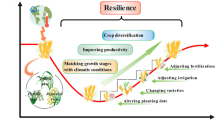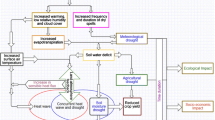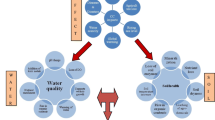Abstract
Canopy temperature (Tc) measurements are increasingly being used to compute crop thermal indices for water stress estimation and improved irrigation management. Conventionally monitoring crop thermal response requires maintenance of a well-watered crop from which non-stressed canopy temperature (Tcns) is measured as a reference for thermal index computation. This study alternatively evaluated the performance of 36 weather data driven model combinations to predict peak time (12:00–17:00 h) Tcns in maize grown in semi-arid climates at the West Central Research, Extension, and Education Center (WCREEC) in North Platte, NE, and at the Limited Irrigation Research Farm (LIRF) in Greeley, CO. Data-driven models considered were multilinear regression (MLR), forward feed neural network (NN), recurrent neural network (RNN), multivariate adoptive regression splines (MARS), random forest (RF), and k-nearest neighbor (KNN). For each of these models, the following weather data combinations were tested: average air temperature (Ta), average relative humidity (RH), wind speed (U2), and solar radiation (Rs) (combination 1); RH, U2, Rs (combination 2), Ta, RH, Rs (combination 3); Ta, RH (combination 4); RH, Rs (combination 5); and Ta, Rs (combination 6). Ranking the performance of weather data × model combinations across both climate sites showed that MARS model with combination 1 was a better predictor of Tcns with R2 of 0.866 and RMSE value of 0.966 °C at WCREEC and R2 of 0.910 and RMSE value of 0.693 °C at LIRF. The performance of site specific (localized) and generalized model combinations was compared and indicated that cross site prediction of Tcns was primarily determined by weather data combinations, rather than model specificity.






Similar content being viewed by others
Data availability
The data from this study will be made available on request.
References
Abyaneh HZ, Nia AM, Varkeshi MB et al (2011) Performance evaluation of ANN and ANFIS models for estimating garlic crop evapotranspiration. J Irrig Drain Eng 137(5):280–286. https://doi.org/10.1061/(asce)ir.1943-4774.0000298
Ahmed K, Sachindra DA, Shahid S et al (2020) Multi-model ensemble predictions of precipitation and temperature using machine learning algorithms. Atmos Res 236:104806. https://doi.org/10.1016/j.atmosres.2019.104806
Allen RG, Pereira LS, Smith M et al (2005) FAO-56 Dual crop coefficient method for estimating evaporation from soil and application extensions. J Irrig Drain Eng 131(1):2–13. https://doi.org/10.1061/(asce)0733-9437(2005)131:1(2)
Allen RG, Pereira LS, Raes D et al (1998) Crop evapotranspiration guidelines for computing crop water requirements. In FAO Irrigation and drainage Paper 56. FAO, Food and Agriculture Organization of the United Nations, Rome https://www.fao.org/3/x0490e/x0490e00.htm
Andrade MA, Evett SR, O’Shaughnessy SA (2018) Machine learning algorithms applied to the forecasting of crop water stress indicators. Proc Irrigation Association Technical Conference
Benos L, Tagarakis AC, Dolias G et al (2021) Machine learning in agriculture: a comprehensive updated review. Sensors 21(11):1–55. https://doi.org/10.3390/s21113758
Bhatti S, Heeren DM, O’Shaughnessy SA et al (2022) Comparison of stationary and mobile canopy sensing systems for maize and soybean in Nebraska, USA. Appl Eng Agric 38(2):331–342. https://doi.org/10.13031/aea.14945
Bilic-Zulle L (2011) Lessons in biostatistics comparison of methods: Passing and Bablok regression. Biochem Med 21(3):49–52
Cárcova J, Maddonni GA, Ghersa CM (1998) Crop water stress index of three maize hybrids grown in soils with different quality. Field Crops Res 55(1–2):165–174. https://doi.org/10.1016/S0378-4290(97)00076-2
Carneiro T, Da Nobrega RVM, Nepomuceno T et al (2018) Performance analysis of google colaboratory as a tool for accelerating deep learning applications. IEEE Access 6:61677–61685. https://doi.org/10.1109/ACCESS.2018.2874767
Colaizzi PD, O’Shaughnessy SA, Evett SR, Andrade MA (2019) Comparison of stationary and moving infrared thermometer measurements aboard a center pivot. Appl Eng Agric 35(6):853–866. https://doi.org/10.13031/aea.13443853
Corell M, Girón IF, Galindo A et al (2014) Using band dendrometers in irrigation scheduling: influence of the location inside the tree and comparison with point dendrometer. Agric Water Manag 142:29–37. https://doi.org/10.1016/j.agwat.2014.04.005
Daryanto S, Wang L, Jacinthe PA (2016) Global synthesis of drought effects on maize and wheat production. PLoS One 11(5):1–15. https://doi.org/10.1371/journal.pone.0156362
DeJonge KC, Taghvaeian S, Trout TJ, Comas LH (2015) Comparison of canopy temperature-based water stress indices for maize. Agric Water Manag 156:51–62. https://doi.org/10.1016/j.agwat.2015.03.023
Elagib NA, Mansell MG (2000) New approaches for estimating global solar radiation across Sudan. Energy Convers Manag 41(5):419–434. https://doi.org/10.1016/S0196-8904(99)00123-5
Evett SR, Schwartz RC, Casanova JJ, Heng LK (2012) Soil water sensing for water balance, ET and WUE. Agric Water Manag 104:1–9. https://doi.org/10.1016/j.agwat.2011.12.002
Food and Agriculture Organization of the United Nations (2021) FAOSTAT online database. https://www.fao.org/faostat/en/
Fente DN, Singh DK (2020) Weather forecasting using artificial neural networks. ICRITO 2020 - IEEE 8th International Conference on Reliability, Infocom Technologies and Optimization (Trends and Future Directions), Icicct, p. 21–26. https://doi.org/10.1109/ICRITO48877.2020.9197993
Ferreira LB, Duarte AB, Da Cunha FF, Filho EIF (2019) Multivariate adaptive regression splines (MARS) applied to daily reference evapotranspiration modeling with limited weather data. Acta Sci Agron 41(1):1–11. https://doi.org/10.4025/actasciagron.v41i1.39880
Friedman JH (1991) Multivariate adaptive regression splines. Ann Stat. 19:1–141
Ge T, Sui F, Bai L et al (2012) Effects of water stress on growth, biomass partitioning, and water-use efficiency in summer maize (Zea mays L.) throughout the growth cycle. Acta Physiol Plant 34(3):1043–1053. https://doi.org/10.1007/s11738-011-0901-y
Ginestar C, Castel JR (1998) Use of stem dendrometers as indicators of water stress in drip-irrigated citrus trees. Acta Hortic 421:209–219. https://doi.org/10.17660/actahortic.1998.421.22
Han M, Zhang H, DeJonge KC et al (2018) Comparison of three crop water stress index models with sap flow measurements in maize. Agric Water Manag 203:366–375. https://doi.org/10.1016/j.agwat.2018.02.030
Hashmi MA, Garcia LA, Fontane DG (1995) Spatial estimation of regional crop evapotranspiration. Trans ASABE 38(5):1345–1351. https://doi.org/10.13031/2013.27957
Heddam S (2021) New formulation for predicting soil moisture content using only soil temperature as predictor: multivariate adaptive regression splines versus random forest, multilayer perceptron neural network, M5Tree, and multiple linear regression. Water engineering modeling and mathematic tools. Elsevier, Amsterdam, pp 45–62
Idso SB, Jackson RD, Pinter PJ Jr et al (1981) Normalizing the stress-degree-day parameter for environmental variability. Agr Meteorol 24:45–55
Ihuoma SO, Madramootoo CA (2017) Recent advances in crop water stress detection. Comput Electron Agric 141:267–275. https://doi.org/10.1016/j.compag.2017.07.026
Irmak S, Haman DZ, Bastug R (2000) Determination of crop water stress index for irrigation timing and yield estimation of corn. J Agron 92(6):1221–1227. https://doi.org/10.2134/agronj2000.9261221x
Jackson RD, Idso SB, Reginato RJ, Pinter PJ (1981) Canopy temperature as a crop water stress indicator. Water Resour Re. 17(4):1133–1138
Jones HG (2004) Irrigation scheduling: advantages and pitfalls of plant-based methods. J Exp Bot 55(407):2427–2436. https://doi.org/10.1093/jxb/erh213
Katimbo A, Rudnick DR, DeJonge KC et al (2022) Crop water stress index computation approaches and their sensitivity to soil water dynamics. Agric Water Manag 266:107575. https://doi.org/10.1016/j.agwat.2022.107575
King BA, Shellie KC (2016) Evaluation of neural network modeling to predict non-water-stressed leaf temperature in wine grape for calculation of crop water stress index. Agric Water Manag 167:38–52. https://doi.org/10.1016/j.agwat.2015.12.009
King BA, Shellie KC, Tarkalson DD, Levin AD, Sharma V, Bjorneberg DL (2020) Data-driven models for canopy temperature- based irrigation scheduling. Trans ASABE 63(5):1579–1592. https://doi.org/10.13031/trans.13901
King BA, Tarkalson DD, Sharma V, Bjorneberg DL (2021) Thermal crop water stress index base line temperatures for sugarbeet in arid western U.S. Agric Water Manag 24:106459. https://doi.org/10.1016/j.agwat.2020.106459
King B, Shellie K (2014) Evaluation of neural network modeling to calculate well- watered leaf temperature of wine grape. In Irrigation Association Conference Proceedings, Nov. 17–21, 2014
Kullberg EG, DeJonge KC, Chávez JL (2017) Evaluation of thermal remote sensing indices to estimate crop evapotranspiration coefficients. Agric Water Manag 179:64–73. https://doi.org/10.1016/j.agwat.2016.07.007
Kumar N, Adeloye AJ, Shankar V, Rustum R (2020) Neural computing modelling of the crop water stress index. Agric Water Manag 239:106259. https://doi.org/10.1016/j.agwat.2020.106259
Kumar M, Raghuwanshi NS, Singh R et al (2020) Estimating of evapotranspiration using artificial neural network. J Irrig Drain Eng 37(1):81–94. https://doi.org/10.21608/mjae.2020.94971
Lena BP, Ortiz BV, Jiménez-López AF et al (2020) Evaluation of infrared canopy temperature data in relation to soil water-based irrigation scheduling in a humid subtropical climate. Trans ASABE 65(3):1217–1231. https://doi.org/10.13031/TRANS.13912
Liakos KG, Busato P, Moshou D et al (2018) Machine learning in agriculture: a review. Sensors 18(8):1–29. https://doi.org/10.3390/s18082674
Lundberg SM, Lee S (2017) A unified approach to interpreting model predictions. Proc Adv Neural Inf Process Syst 2017:4768–4777
Meshram V, Patil K, Meshram V et al (2021) Machine learning in agriculture domain: a state-of-art survey. Artif Intell Life Sci 1:100010. https://doi.org/10.1016/j.ailsci.2021.100010
Meyers JN, Kisekka I, Upadhyaya SK, Michelon G (2019) Development of an artificial neural network approach for predicting plant water status in almonds. Trans ASABE 62(1):19–32. https://doi.org/10.13031/trans.12970
Mucherino A, Papajorgji P, Pardalos PM (2009) A survey of data mining techniques applied to agriculture. Oper Res 9(2):121–140. https://doi.org/10.1007/s12351-009-0054-6
Nakabuye HN, Rudnick DR, DeJonge KC et al (2022) Real-time irrigation scheduling of maize using degrees above non-stressed (Dans) index in semi-arid environment. Agric Water Manag 274:107957. https://doi.org/10.1016/j.agwat.2022.107957
Nanda MK, Giri U, Bera N (2018) Advances in crop environment interaction. Springer, Singapore
O’Shaughnessy SA, Colaizzi PD, Bednarz CW (2023) Sensor feedback system enables automated deficit irrigation scheduling for cotton. Front Plant Sci 14(3):1–14. https://doi.org/10.3389/fpls.2023.1149424
Panday US, Pratihast AK, Aryal J, Kayastha RB (2020) A review on drone-based data solutions for cereal crops. Drones 4(3):1–29. https://doi.org/10.3390/drones4030041
Payero JO, Irmak S (2005) Variable upper and lower crop water stress index baselines for corn and soybean. Irrig Sci 25(1):21–32. https://doi.org/10.1007/s00271-006-0031-2
Peters RT, Evett SR (2004) Modeling diurnal canopy temperature dynamics using one-time-of-day measurements and a reference temperature curve. J Agron 96(6):1553–1561. https://doi.org/10.2134/agronj2004.1553
Praveen B, Sharma P (2020) Climate Change and its impacts on Indian agriculture: an econometric analysis. J Public Aff 20(1):1–6. https://doi.org/10.1002/pa.1972
Psichogios DC, De Veaux RD, Ungar LH (1992) Non parametric system identification: a comparison of MARS and Neural Networks. In Proceedings of American Control Conference, p. 1436–1441
Ranum P, Peña-Rosas JP, Garcia-Casal MN (2014) Global maize production, utilization, and consumption. Ann NY Acad Sci 1312(1):105–112. https://doi.org/10.1111/nyas.12396
Shapiro CA, Ferguson RB, Wortmann CS et al (2019). Nutrient Management Suggestions for Corn (EC117). CropWatch Vol. EC117, 1–7
Song L, Jin J, He J (2019) Effects of severe water stress on maize growth processes in the field. Sustainability 11(18):5086. https://doi.org/10.3390/su11185086
Stone KC, Bauer PJ, O’Shaughnessy SA et al (2020) A variable-rate irrigation decision support system for corn in the U.S. Eastern Coastal plain. Trans ASABE 65(3):1295–1303. https://doi.org/10.13031/TRANS.13965
Taghvaeian S, Comas L, DeJonge KC, Trout TJ (2014) Conventional and simplified canopy temperature indices predict water stress in sunflower. Agric Water Manag 144:69–80. https://doi.org/10.1016/j.agwat.2014.06.003
Tigchelaar M, Battisti DS, Naylor RL, Ray DK (2018) Future warming increases probability of globally synchronized maize production shocks. Proc Natl Acad Sci USA 115(26):6644–6649. https://doi.org/10.1073/pnas.1718031115
Tramontana G, Jung M, Schwalm CR et al (2016) Predicting carbondioxide and energy fluxes across global FLUXNET sites with regression algorithms. Biogeosciences 13(14):4291–4313. https://doi.org/10.5194/bg-13-4291-2016
Wei G, Dong X, Hu A (2011) Discuss on reference crop evapotranspiration in arid zone based on principal component analysis. ISWREP 2011 - Proceedings of 2011 International Symposium on Water Resource and Environmental Protection, 4, 2900–2903. https://doi.org/10.1109/ISWREP.2011.5893483
Yamaç SS (2021) Artificial intelligence methods reliably predict crop evapotranspiration with different combinations of meteorological data for sugar beet in a semiarid area. Agric Water Manag 254(9):106968. https://doi.org/10.1016/j.agwat.2021.106968
Yamaç SS, Todorovic M (2020) Estimation of daily potato crop evapotranspiration using three different machine learning algorithms and four scenarios of available meteorological data. Agric Water Manag 228:105875. https://doi.org/10.1016/j.agwat.2019.105875
Yang CC, Prasher SO, Lacroix R, Kim SH (2003) A multivariate adaptive regression splines model for simulation of pesticide transport in soils. Biosyst Eng 86(1):9–15. https://doi.org/10.1016/S1537-5110(03)00099-0
Yang M, Gao P, Zhou P et al (2021) Simulating canopy temperature using a random forest model to calculate the crop water stress index of Chinese brassica. Agronomy 11(11):2244. https://doi.org/10.3390/agronomy11112244
Zanetti SS, Sousa EF, Oliveira VP et al (2007) Estimating evapotranspiration using artificial neural network and minimum climatological data. J Irrig Drain Eng 133(2):83–89. https://doi.org/10.1061/(asce)0733-9437(2007)133:2(83)
Zhang Y, Zhao Z, Zheng J (2020) CatBoost: A new approach for estimating daily reference crop evapotranspiration in arid and semi-arid regions of Northern China. J Hydrol 588:125087. https://doi.org/10.1016/j.jhydrol.2020.125087
Zhou Z, Majeed Y, Diverres NG, Gambacorta EMT (2021) Assessment for crop water stress with infrared thermal imagery in precision agriculture: A review and future prospects for deep learning applications. Comput Electron Agric 182:106019. https://doi.org/10.1016/j.compag.2021.106019
Acknowledgments
The authors are grateful to Turner Dorr, who assisted in data collection; to farm operations personnel for supporting in field management; and to the Nebraska State Climate Office Nebraska (Nebraska Mesonet) and the Colorado Agricultural Meteorological Network (CoAgMet) for availing the weather data. This study is based upon work that was jointly supported by the United States Department of Agriculture’s National Institute of Food and Agriculture under award # 2017–68007-26584, “Securing Water for and from Agriculture through Effective Community & Stakeholder Engagement”; Hatch projects #1015698; the Daugherty Water for Food Global Institute; and the University of Nebraska–Lincoln Institute of Agriculture and Natural Resources.
Author information
Authors and Affiliations
Contributions
Hope Njuki Nakabuye: Conceptualization, Methodology, Formal analysis, Investigation, Writing – Original Draft, Writing – Review & Editing. Daran R. Rudnick: Conceptualization, Methodology, Writing – Review & Editing, Supervision. Kendall C. DeJonge: Conceptualization, Methodology, Writing – Review & Editing. Katherine Ascough: Data Organization and Analysis, Methodology. Weizhen Liang: Conceptualization, Methodology, Writing – Review & Editing. Tsz Him Lo: Conceptualization, Methodology, Writing – Review & Editing. Trenton E. Franz: Conceptualization, Methodology, Writing – Review & Editing. Xin Qiao: Conceptualization, Writing – review & editing. Abia Katimbo: Writing – Review & Editing. Jiaming Duan: Writing – Review & Editing.
Corresponding author
Ethics declarations
Conflict of interest
The authors hereby declare no known conflicting interests that influenced this research and manuscript.
Additional information
Publisher's Note
Springer Nature remains neutral with regard to jurisdictional claims in published maps and institutional affiliations.
Rights and permissions
Springer Nature or its licensor (e.g. a society or other partner) holds exclusive rights to this article under a publishing agreement with the author(s) or other rightsholder(s); author self-archiving of the accepted manuscript version of this article is solely governed by the terms of such publishing agreement and applicable law.
About this article
Cite this article
Nakabuye, H.N., Rudnick, D.R., DeJonge, K.C. et al. Weather data-centric prediction of maize non-stressed canopy temperature in semi-arid climates for irrigation management. Irrig Sci 42, 229–248 (2024). https://doi.org/10.1007/s00271-023-00863-w
Received:
Accepted:
Published:
Issue Date:
DOI: https://doi.org/10.1007/s00271-023-00863-w




